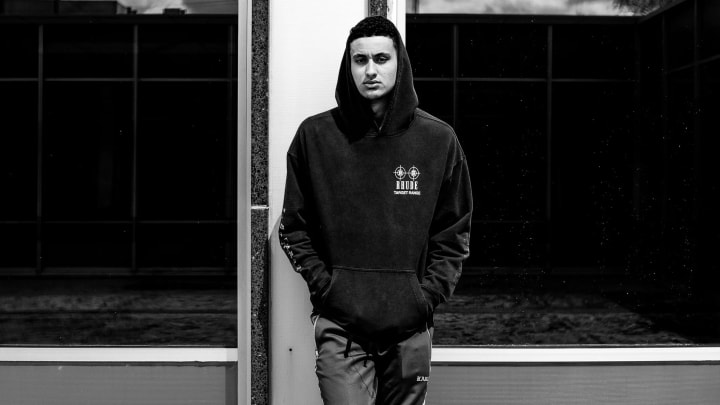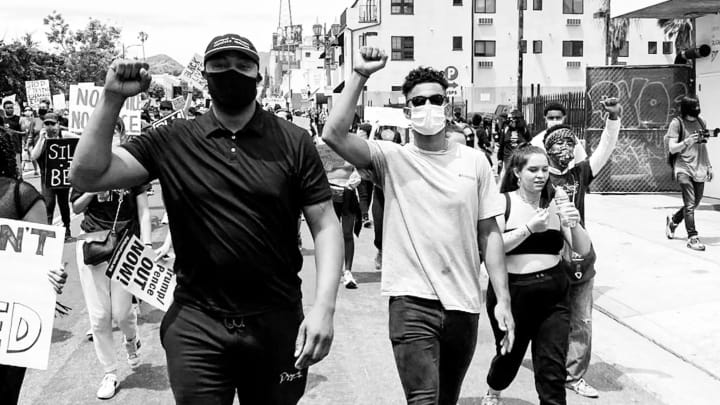
Ain’t No Sticking to Sports
I was raised by my mom in Flint, Michigan. Our neighborhood was blue-collar, and pretty much all black. We lived right across the street from a General Motors plant.
I’m mixed (my mom is white and my dad is black), and as far as my identity growing up, it was really in the eye of the beholder. When I was a kid, some of the black kids in my neighborhood would say, “You’re not black.” But then when I got to Bentley High, all of a sudden I’m like one of the only black kids at an all-white school. I heard all kinds of racist things, racist jokes.
None of those kids saw me as anything but black.
I’m sure a lot of biracial kids have that kind of similar story of not being black enough for the black kids and not being white enough for the white kids. As a kid, you don’t know the history behind all that. You can only really see the situation like the black community is telling you, “You’re only half of us.” While to the white community, you’re just black, or worse — you’re a nigger. (They actually said stuff like that in front of me when I was in high school.)
So, yeah, for me just personally, growing up, I got hit from both sides. It was what it was.
For me just personally, growing up, I got hit from both sides. It was what it was.
My mom had some issues with people on her side of the family who were very against her having biracial kids. But we never had to talk about it. My mom raised me to love and preach unity.
That’s why, to this day, man, my stance is: We’re people.
At the end of the day, we all gotta come together as people.
But I know that will never happen until white people actually understand what African-Americans have gone through in the past, still go through in the present and will probably continue to go through in the future.
Everybody is marching together across the country because we actually want to see shit CHANGE.
But first you have to understand the problem before you can change it.
Every person in the world has something in their soul, something in their mind, that they just do not want to talk about or address within themselves, whether that is body insecurities, past traumas, or whatnot.
America’s thing that we just do not want to talk about, as a country, is race.
The first thing you have to understand is that racism is in every part of society. It’s in the law, it’s economic, it’s person-to-person. It’s basically at every level.
The second thing you have to understand is that society made it that way from years and years and years of systematic oppression.
These issues are so, so ingrained.
That’s why white people have to realize, it’s not just about your “heart” or your individual mindset. Like how some people say, “I don’t have a racist bone in my body.”
Well, the system does, and you can’t see it because it benefits you.
The best analogy I’ve heard that explains white privilege is that it’s like an invisible backpack that every white person wears. If you’re white and you’re ever in a situation where you might need help, you can take that backpack off, open it up, and pull out all sorts of shit.
Get Out of Jail Free card.
Job opportunities.
Health benefits.
Housing loans.
Don’t get me wrong. Black people can get those things, too, but it’s a lot harder.
Also, think about how everything that affects this country economically or health-wise has ended up worse for the black community.
The Great Depression. The Great Recession. Natural disasters like Katrina. Coronavirus.
The best analogy I’ve heard that explains white privilege is that it’s like an invisible backpack that every white person wears.
When housing markets crashed during the 1930s, it hit black people the hardest. They were laid off before everybody else. Unemployment rate was higher. And after it was over, the government was able to give almost every major demographic an economic boost to help them get back on their feet, except black people, obviously.
I was a teenager in 2008, during the Great Recession.
When the recession hit, it seemed like most of the people in Flint lost their jobs — close to 20,000 in a city with a population of just 100,000.
A lot of people who lost their jobs were black, and worked at places like the GM plant across the street from my house.
Everybody knows Flint as one of those violent hotspots. A city with no clean water or development. But I bet a lot of people don’t know that in the ’50s and ’60s, Flint was one of the fastest growing places in the country. The auto industry was birthed out of Michigan, and when it was booming, Flint was up and coming.
From just an economic standpoint, trying to get that city back … it has never been back.
Ever since the recession, there’s really no hope there. There’s no financial give.
The place where I grew up has been hurting.
Growing up in a place like Flint — or probably any middle American small town — really shows you how race and economics go hand-in-hand.
You can’t understand what happened to George Floyd unless you understand the past.
Racism is about slavery more than anything else, and how those stories of slavery have been passed along to white families for centuries and centuries.
In something called the Cornerstone Speech, the Confederate vice president, who led the people fighting for slavery in the Civil War, literally said their movement was based on the idea that white people were ALWAYS going to be superior to blacks. That from birth, black people were meant to live as slaves.
He said: “Our new government foundations are laid, its cornerstone rests, upon the great truth that the negro is not equal to the white man.”
And when slaves were emancipated in 1865, and when the Civil War was done, it wasn’t just like boom, black people are free, racism is done, you know?
At that time, black freedom was scary to a lot of white people in this country. There were plenty of people who wanted slavery to continue. I’m talking senators and people in power. Lawmakers with that mindset.
So, laws were put into place after slavery to put black people in a kind of ditch that would be tough to get out of.
Look at the 13th amendment. It abolished slavery except as punishment for a crime.
Essentially, they were saying, O.K., they’re free now, but they can’t be free if they’re criminals. So, let’s make them criminals. Let’s make rules so tough that it’s easy for them to mess up.
Flash forward to the Nixon and the Reagan presidencies, and how they said, Let’s go to WAR on drugs.
Not because all drugs are super, super harmful to society, but because drugs were something very prevalent in black communities. It was how people put food on the table for their families in neighborhoods where people were frozen out of jobs.
So, what happened next? Let’s crack down. “Zero Tolerance.” You’re a prisoner now. From having just a gram or two of weed.
See the connection?
That’s what people are talking about when they speak about how racism is systemic.
You think this moment happened because all police are just terrible, terrible people?
Nah, it’s wayyy bigger than that.
My grandmother was actually a lieutenant in the Flint police department. I know there are great police officers out there. But even though that is a part of my family, being black in America, no matter who you are, famous or not, you’re still always going to be paranoid of the cops.
Even as an athlete, I’m still scared when I get pulled over. If I’m driving and I see a cop, I’m checking my rearview mirror for like the next five minutes.
That is the epitome of what this has done to us as black people, living in a racist society.
That’s what we have to fear: the people who are supposed to protect us.
And that fear didn’t come from nowhere.
Listen, I know I’m no expert on this stuff. I’m just sharing a little bit of what I know and feel. I don’t have a PowerPoint presentation about how we’re going to end systemic oppression.
But I do know that, as an athlete, speaking up and trying to EDUCATE people matters.
It’s just amazing when you look at everything that African-Americans have been through in society and to see where we were, from being in boats and shackles to being billionaires and building our own culture that everyone tries to copy and our own ways of life.
There’s definitely been change. But we have to understand how far we still have to go.
If you ask me, this is the most the United States has actually been “united” in a long time. Like if you look closely at the Black Lives Matter marches, there are a lot of white people out there, which is a crazy thing to see, you know?
My thing about this time, if we’re being 100% honest, I believe that this is such a monumental time in our society, because we’ve never had this many white people really understand and grasp like, This is not right.
This is wrong.
I remember after Trayvon Martin’s death, in the early days of Black Lives Matter, it was mainly just black people preaching against anti-blackness and police brutality.
But now you see thousands upon thousands of white people standing with us.
There’s even pressure on businesses. I think a lot of businesses in this country have only taken a stand because they don’t want to be called out like, You haven’t said anything yet. Why haven’t you said anything? Why haven’t you done anything?
And I don’t want this to change!! Because, every time in the past when a black person was killed, we’ve talked about how it’s not right and that black lives matter, and then everyone has just gone back to their regularly scheduled lives.
Shit has to be different this time.
For that to happen, we have to do two things at once — KEEP UP the noise. Keep protesting, marching. Keep demanding CHANGE in the STREETS.
But also demand that change on election day.
We have to vote out people that blindly support spending more on police departments than on healthcare and education. And we also have to vote out the people who aren’t making the change that we want fast enough.
So I’m doing something about it.
We have to vote out people that blindly support spending more on police departments than on healthcare and education.
I’m launching a voting campaign that’s going to help get people’s eyes on where primaries and elections are being held in every state this year. I’m dropping something very soon.
But in the meantime, let’s keep educating ourselves. Because that’s what made the biggest difference in my own learning process. That’s the biggest thing: Education.
You know, back when this all started, during slavery, the one thing that the white man feared was a black man that had a mind of his own.
Someone who could READ.
Someone who could WRITE.
Someone who could THINK for themselves.
Someone who could VOTE.
You know why? Because that person could stand up!!
And that’s what I’m doing and going to continue to do until all people are free.

